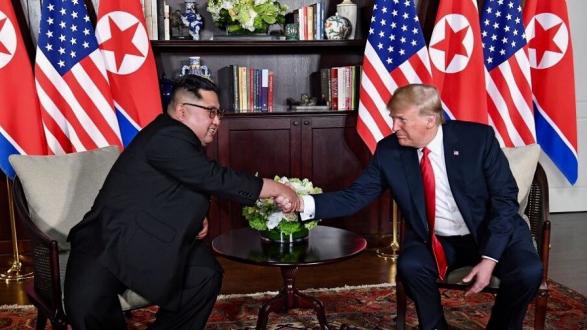The morning after returning from his meeting with North Korea’s Kim Jong-un in Singapore, President Trump took to Twitter to announce that "there is no longer a Nuclear Threat from North Korea," claiming he had "solved that problem...we’re getting it memorialized and all, but that problem is largely solved." He went on to express anger that the press was "fighting hard to downplay the deal with North Korea."
In reality, it is difficult to downplay a deal that does not yet exist. President Trump took a risk and put his credibility on the line by reopening the door to negotiations with the Democratic People's Republic of Korea (DPRK). The good news is that tensions are lower and the two sides are talking, but there is danger in overstating how far we’ve come.
Last month, I wrote that President Trump was setting unrealistic expectations going into his meeting with Kim. Falling short of those expectations, the president and his team have decided to create an alternate reality in which he actually exceeded them. The fact is that we are not meaningfully closer to a denuclearized North Korea than we were the day before the summit. In a best-case scenario, the June 12 summit will be the first step on a long road toward a workable agreement to reduce the threat Pyongyang poses to the United States and its neighbors.
The culmination of the summit was the signing of a "comprehensive" joint statement signed by Trump and Kim in which both sides essentially recommitted to an earlier status quo. They promised to "establish new U.S.-DPRK relations in accordance with the desire…for peace and prosperity." This, as Joshua Pollack notes, is "a vow that Washington and Pyongyang renew about every five to six years." The statement also makes nods toward building "a lasting and stable peace regime on the Korean Peninsula" and a resumption of POW/MIA remains repatriation. While these are both laudable and important, they are hardly new ground.
While I remain hopeful President Trump’s Singapore gambit will pay off down the road, Pyongyang has already reaped real short-term benefits.
Most significantly for the Trump administration, Pyongyang also reaffirmed its April commitment to "work toward the complete denuclearization of the Korean Peninsula." As I argued in May, this statement has very different meanings in Pyongyang and Washington. Contrary to the president’s claims, it does not mean that the denuclearization process will start "very quickly" and it actually falls short of North Korea’s 2005 commitments to a "verifiable denuclearization of the Korean Peninsula" and to "abandoning all nuclear weapons and existing nuclear programs."
The gap between the DPRK and U.S. positions remains vast. The Trump administration continues to insist that sanctions on North Korea will remain in place until Pyongyang has completed full denuclearization, while North Korean state press describes a "step-by-step" process in which Pyongyang sees reciprocal benefits from the United States. The U.S. State Department has years of difficult negotiations ahead of them and the hard work is just getting started.
While I remain hopeful President Trump’s Singapore gambit will pay off down the road, Pyongyang has already reaped real short-term benefits. By standing on the world stage in front of a backdrop alternating U.S. and DPRK flags, President Trump bestowed on Kim a degree of international legitimacy that his father and grandfather had long sought but failed to obtain. The president of the United States praised Kim as "a great personality and very smart." He said it was an "honor" to meet a man who "loves his country very much," adding that "his country does love him. His people, you can see the fervor. They have great fervor." (North Korea is currently estimated to have up to 120,000 political prisoners).
It seems clear that the president is eager to claim a comprehensive deal in order to score a political win, but the real work is just getting started.
President Trump went a step further, granting Pyongyang a long-sought concession in announcing that the United States would stop participating in joint military exercises ("war games") with South Korea. This seems to have been decided on the spot, without any consultations with our South Korean partners or reciprocal action from the North Koreans.
On Monday, the United States announced it was suspending all planning for the August multilateral Ulchi Freedom Guardian exercise that was intended to train U.S., South Korean, and international troops on how to respond to a North Korean attack. It is unclear what additional military activities will continue or what impact this decision will have on our ability to respond to a North Korean offensive, but the president’s suggestion that readiness can be restored instantly at the first sign of aggression is simply untrue.
It seems clear that the president is eager to claim a comprehensive deal in order to score a political win, but the real work is just getting started. Negotiations with Pyongyang will be difficult, with setbacks and disappointments, but with time and political space, a deal is possible. Secretary of State Mike Pompeo appears to understand this, setting a goal of "major disarmament" within the next two and a half years. We should all hope they succeed.
_______________________
Thomas Zimmerman is the chief programs officer at the Pacific Council.
The views and opinions expressed here are those of the author and do not necessarily reflect the official policy or position of the Pacific Council.




